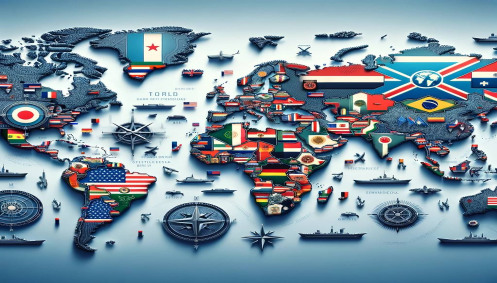
Geopolitical risk refers to the uncertainties and potential financial losses businesses and investors face due to political changes or instability in a country. This includes changes in government, legislative alterations, regulatory shifts, and social unrest. Analyzing these risks involves a multidisciplinary approach, combining insights from economics, political science, and game theory.
Game theory, a mathematical framework for analyzing strategic interactions, plays a crucial role in geopolitical risk analysis. It helps predict the behavior of various stakeholders, including governments, political parties, and interest groups. By modeling these interactions, analysts can anticipate potential political developments and their impacts on financial markets.
Applications of geopolitical risk analysis are vast. One significant area is in understanding how wars and conflicts affect markets. Armed conflicts often lead to volatility in commodity prices, especially oil and metals, as supply chains are disrupted. Additionally, markets tend to react negatively to the uncertainty caused by conflicts, leading to capital flight to safer assets such as gold and government bonds. For instance, during the Gulf War, oil prices surged, impacting global inflation rates and economic growth.
Elections are another critical focus of geopolitical risk analysis. Changes in political leadership can lead to shifts in economic policies, affecting sectors differently. For example, an election resulting in a government favoring renewable energy may boost investments in green technologies while adversely impacting traditional energy sectors. Similarly, elections that lead to heightened trade protectionism can disrupt global supply chains, affecting multinational corporations’ strategies and stock prices.

Geopolitical risk analysis also informs corporate decision-making. Companies operating internationally must navigate diverse political landscapes, and understanding political risks helps them mitigate potential losses. For instance, a corporation considering investment in a country with upcoming elections might delay its decision until the political climate stabilizes. Alternatively, firms may diversify their investments across multiple regions to spread risk.
Historical examples illustrate the profound impact of geopolitical events on financial markets. The oil embargo of 1973, initiated by the Organization of Arab Petroleum Exporting Countries (OAPEC), had a monumental impact on global financial markets. The embargo led to skyrocketing oil prices, triggering inflation and economic recessions in many countries. It highlighted the geopolitical vulnerabilities of relying on oil imports and spurred a shift towards exploring alternative energy sources and improving energy efficiency.
Another significant example is the apartheid divestment movement in South Africa. In the 1980s, international pressure and economic sanctions, coupled with widespread divestment from South African assets, significantly impacted the country’s economy. Investors pulled out their funds, leading to a decline in the value of the South African rand and affecting companies with substantial operations in the country. The political pressure eventually contributed to the dismantling of apartheid.
The Iran-Contra affair in the 1980s also underscored the impact of geopolitical risks on financial markets. The scandal involving secret arms sales to Iran and the diversion of proceeds to Contra rebels in Nicaragua created political instability and uncertainty. Markets responded with increased volatility as investors weighed the potential repercussions on U.S. foreign policy and domestic political stability.
In Canada, the Quebec sovereignty movement and the 1995 Quebec independence referendum posed significant geopolitical risks. The possibility of Quebec seceding from Canada created economic uncertainty, affecting investment decisions and financial markets. Businesses had to consider the implications of a potential separation, including changes in trade agreements, currency stability, and regulatory environments.
The Brexit referendum in 2016 is a notable case. The unexpected vote to leave the European Union caused immediate turmoil in the financial markets, with the British pound plummeting to its lowest level in decades. Companies with significant exposure to the UK had to rapidly adjust their strategies, considering potential changes in trade regulations, labor mobility, and tariffs.
The 2020 US presidential election showcased how political uncertainty can drive market volatility. Leading up to the election, markets experienced fluctuations as investors tried to gauge the potential impact of different policy platforms on sectors such as healthcare, technology, and finance. Post-election, markets reacted positively to the resolution of uncertainty, despite ongoing debates over specific policy implementations.

Understanding the nexus between geopolitical risk and financial markets is crucial for informed investment and corporate strategies. By incorporating geopolitical risk analysis into their decision-making processes, investors and businesses can better navigate uncertainties and capitalize on opportunities in a volatile global landscape. This approach not only helps mitigate potential losses but also allows for strategic positioning to benefit from political developments. As the world continues to evolve, the ability to analyze and respond to geopolitical risks will remain a critical component of financial and corporate success.